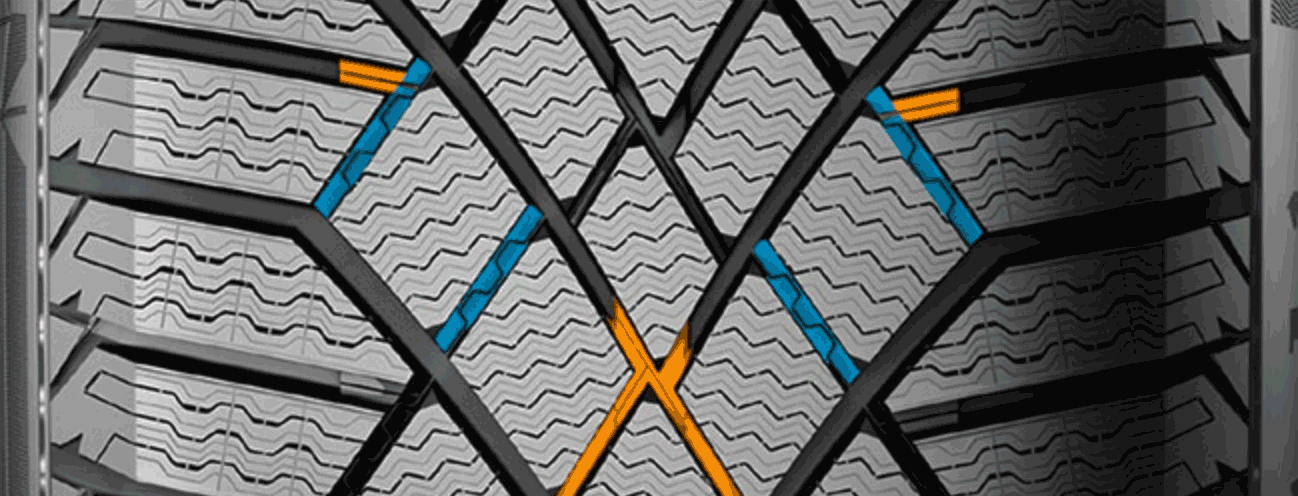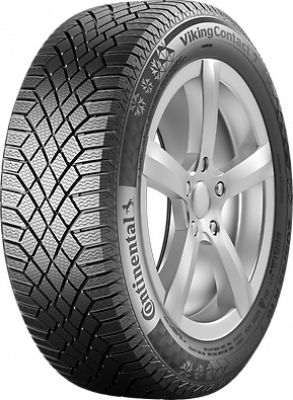Continental VikingContact 7 is a directional winter tire with a studless tread, created by German developers for use in rough conditions of northern countries.
They are notable for their reliable grip on icy and snowy roads, as well as steering stability and braking efficiency on wet snow and wet asphalt. New for the 2018/2019 winter season.

Better performance
Friction tires for Scandinavian winters Continental VikingContact 7 came to replace the model Continental VikingContact 6, in comparison with which they received a number of improvements in terms of stability on snow and wet surface. The manufacturer claims that aquaplaning resistance of the new Viking has been improved by 7%, the length of braking distance in wet conditions was reduced by 6%, while controllability on ice and soft snow increased by 4%. In addition, handling on snow and dry roads showed a 2% improvement while rolling resistance was reduced by 3%.
Optimized tread design
Working on creation of Continental Viking Contact 7 developers abandoned optimization of asymmetric tread pattern of its predecessor and endowed the model with a new directional design. A grid of deep draining grooves ensures fast dispersion of melted snow and water in the contact zone and helps to improve the safety of these tires on wet and snow-covered roads.

To increase the stiffness of the soft tread, which is vital for the tire's precision and responsiveness to steering turns, the tread blocks are linked together by special "bridges", which improve grip stability when cornering and changing lanes.

Driving on ice and snow
When driving the Continental VikingContact 7 on ice and snow, 3D sipes come into play. These not only increase the edge effect but also create snow pockets that, when filled with snow, provide additional traction resulting from snow to snow friction.
On ice, the sharp edges of the three-dimensional blades create an effect similar to the action of antiskid spikes. By grappling with the top layer of ice, they increase acceleration and help shorten braking distances.
To enhance the tire's "sticking" to winter coatings, German engineers provided the presence of two types of blades - V-shaped in the center and U-shaped in the shoulder areas.
Innovative rubber ingredients
In addition to silicic acid (silica) the composition of VikingContact 7 rubber compound includes rapeseed oil. This ensures good low-temperature elasticity of the tread, allowing the tire to hold a firm grip in all weather conditions of northern winters.
The Continental VikingContact 7 is the perfect all-rounder for northern winters.
In this article, we use data collected from numerous daily driver reviews and professional automotive journalists' road tests. This guide shows computed data charts and information about VikingContact 7 performance in different road conditions.
VikingContact 7 scores:
Tire scores charts by drivers' reviews:
Overall:Tire scores charts by road tests:
Overall:Continental VikingContact 7 test results:
2020 Nordic and Studded Winter tire Test
- Overall: 6th of 21
- Dry Braking: 12th of 21
- Subj. Dry Handling: 14th of 21
- Wet Braking: 13th of 21
- Wet Handling: 6th of 21
- Subj. Wet Handling: 3rd of 21
- Snow Braking: 1st of 21
- Snow Handling: 1st of 21
- Subj. Snow Handling: 1st of 21
- Snow Traction: 1st of 21
- Ice Braking: 9th of 21
- Ice Handling: 7th of 21
- Subj. Ice Handling: 4th of 21
- Ice Traction: 9th of 21
- Inside Noise level: 1st of 21
- Rolling Resistance: 5th of 21
2019 Studded Winter tire Test
- Overall: 3rd of 8
- Dry Braking: 1st of 8
- Subj. Dry Handling: 6th of 8
- Wet Braking: 5th of 8
- Wet Handling: 8th of 8
- Straight Aquaplaning: 8th of 8
- Snow Braking: 1st of 8
- Snow Handling: 2nd of 8
- Snow Traction: 1st of 8
- Ice Braking: 4th of 8
- Ice Handling: 1st of 8
- Ice Traction: 7th of 8
